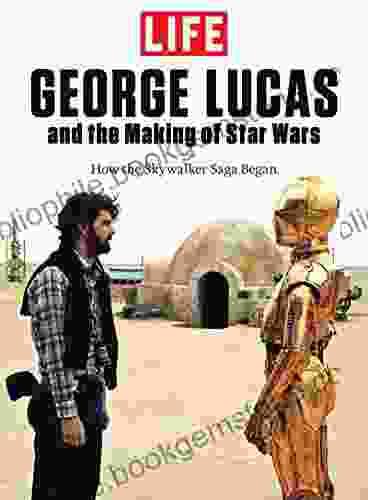15 Logical Fallacies You Should Avoid in Arguments

Arguments are an essential part of everyday life. We use them to persuade others to see our point of view, to make decisions, and to solve problems. However, not all arguments are created equal. Some arguments are based on sound logic and evidence, while others are based on faulty reasoning and logical fallacies.
Logical fallacies are errors in reasoning that can lead to false or misleading s. They can be intentional or unintentional, and they can be difficult to spot, especially if you're not familiar with them.
4.4 out of 5
| Language | : | English |
| File size | : | 380 KB |
| Text-to-Speech | : | Enabled |
| Screen Reader | : | Supported |
| Enhanced typesetting | : | Enabled |
| Word Wise | : | Enabled |
| Print length | : | 58 pages |
| Lending | : | Enabled |
In this article, we'll discuss fifteen common logical fallacies and provide examples of how they can be used in arguments. We'll also show you how to identify and avoid these fallacies in your own arguments.
1. Ad Hominem
An ad hominem fallacy is an attack on the person making the argument, rather than on the argument itself. This type of fallacy is often used to discredit the opponent and make their argument seem less credible.
For example, if someone argues that we should ban smoking in public places, an ad hominem fallacy would be to respond by saying that the person is a hypocrite because they smoke themselves.
2. Straw Man
A straw man fallacy is a misrepresentation of the opponent's argument in order to make it easier to attack. This type of fallacy is often used to create a false dichotomy, where the opponent is forced to choose between two extreme options.
For example, if someone argues that we should increase taxes on the wealthy, a straw man fallacy would be to respond by saying that the person wants to raise taxes on everyone, including the poor.
3. Red Herring
A red herring fallacy is a distraction from the main topic of the argument. This type of fallacy is often used to derail the discussion and make it more difficult to focus on the real issues.
For example, if someone argues that we should invest in renewable energy, a red herring fallacy would be to respond by talking about the dangers of nuclear power.
4. Appeal to Emotion
An appeal to emotion fallacy is an attempt to persuade someone based on their emotions, rather than on logic or evidence. This type of fallacy is often used in advertising and propaganda, and it can be very effective in swaying people's opinions.
For example, an advertisement for a new car might use an appeal to emotion by showing happy families driving the car and enjoying themselves.
5. Appeal to Ignorance
An appeal to ignorance fallacy is an argument that something must be true because it has not been proven false, or that something must be false because it has not been proven true. This type of fallacy is often used to support conspiracy theories and other unfounded claims.
For example, someone might argue that aliens must exist because there is no evidence to prove that they don't.
6. Begging the Question
A begging the question fallacy is an argument that assumes the truth of the in order to prove the . This type of fallacy is often used in circular reasoning, where the premise and the are essentially the same thing.
For example, someone might argue that God exists because the Bible says so, and then use the Bible as evidence to prove that God exists.
7. False Dilemma
A false dilemma fallacy is an argument that presents only two options, when in reality there are more than two options available. This type of fallacy is often used to force people to choose between two extreme options, even if neither option is acceptable.
For example, someone might argue that we must either go to war or surrender, when in reality there are many other options available, such as diplomacy or negotiation.
8. Hasty Generalization
A hasty generalization fallacy is an argument that draws a general from a small or unrepresentative sample. This type of fallacy is often used to make sweeping generalizations about entire groups of people or things.
For example, someone might argue that all Muslims are terrorists because they have seen a few news stories about Muslim terrorists.
9. Post Hoc Ergo Propter Hoc
A post hoc ergo propter hoc fallacy is an argument that assumes that because one event happened after another event, the first event must have caused the second event. This type of fallacy is often used to support superstitious beliefs and other unfounded claims.
For example, someone might argue that their lucky charm brought them good luck because they won the lottery after they started wearing it.
10. Slippery Slope
A slippery slope fallacy is an argument that claims that a series of small steps will inevitably lead to a larger, more undesirable outcome. This type of fallacy is often used to scare people into taking action or to prevent them from taking action.
For example, someone might argue that if we allow same-sex marriage, then we will eventually allow polygamy and incest.
11. Appeal to Authority
An appeal to authority fallacy is an argument that claims that something is true because an expert or authority figure said it is true. This type of fallacy is often used to support claims that are not supported by evidence or logic.
For example, someone might argue that we should believe in astrology because it is supported by famous astrologers.
12. Appeal to Tradition
An appeal to tradition fallacy is an argument that claims that something is true because it has always been done that way. This type of fallacy is often used to resist change and to support traditional values and beliefs.
For example, someone might argue that we should not allow women to vote because women have never been allowed to vote before.
13. Appeal to Nature
An appeal to nature fallacy is an argument that claims that something is good or natural because it is found in nature. This type of fallacy is often used to support claims about nutrition, health, and the environment.
For example, someone might argue that organic food is healthier than non-organic food because organic food is more natural.
14. Tu Quoque
A tu quoque fallacy is an argument that attempts to discredit an argument by pointing out the hypocrisy of the person making the argument. This type of fallacy is often used to silence dissent and to avoid having to address the actual issues in the argument.
For example, if someone argues that we should ban smoking in public places, a tu quoque fallacy would be to respond by saying that the person is a hypocrite because they smoke themselves.
15. False Equivalence
A false equivalence fallacy is an argument that claims that two things are equivalent when they are not actually equivalent. This type of fallacy is often used to make one thing seem better or worse than it actually is.
For example, someone might argue that socialism is the same as communism, when in reality they are two very different political systems.
In this article, we have discussed fifteen common logical fallacies and provided examples of how they can be used in arguments. We have also shown you how to identify and avoid these fallacies in your own arguments.
By understanding logical fallacies, you can become a more critical thinker and a more persuasive communicator. You will be less likely to be fooled by fallacious arguments, and you will be better able to defend your own arguments against attack.
4.4 out of 5
| Language | : | English |
| File size | : | 380 KB |
| Text-to-Speech | : | Enabled |
| Screen Reader | : | Supported |
| Enhanced typesetting | : | Enabled |
| Word Wise | : | Enabled |
| Print length | : | 58 pages |
| Lending | : | Enabled |
Do you want to contribute by writing guest posts on this blog?
Please contact us and send us a resume of previous articles that you have written.
 Best Book
Best Book Page Flip
Page Flip Bookshelf
Bookshelf Literary loom
Literary loom Chapter
Chapter Bookish
Bookish PageTurner
PageTurner Bibliophile
Bibliophile Story
Story Inkwell
Inkwell Bookworm
Bookworm Labyrinth
Labyrinth Plot Twist
Plot Twist Prose
Prose Paperback
Paperback Storyteller
Storyteller Sanctuary
Sanctuary Fiction
Fiction Reading
Reading Chronicle
Chronicle Read
Read Nathan Mccall
Nathan Mccall Debra Gwartney
Debra Gwartney Judy Batalion
Judy Batalion David Sobotta
David Sobotta Jim Gertz
Jim Gertz Max Wilk
Max Wilk Tom Kidd
Tom Kidd Lucy Grealy
Lucy Grealy Bob Spitz
Bob Spitz Jonquil Graham
Jonquil Graham The Dancing Pages Publishing House
The Dancing Pages Publishing House Heinz Peter Wagner
Heinz Peter Wagner Joanne Fluke
Joanne Fluke Joseph Heywood
Joseph Heywood Robert Mccammon
Robert Mccammon Susan Zwerman
Susan Zwerman Robin Landa
Robin Landa Julius Schnorr Von Carolsfeld
Julius Schnorr Von Carolsfeld Nicole Falls
Nicole Falls Carl Weber
Carl Weber George R R Martin
George R R Martin Neil Gaiman
Neil Gaiman Jim Schutze
Jim Schutze Masakazu Ishikawa
Masakazu Ishikawa Joseph Luzzi
Joseph Luzzi Carolyn Phillips
Carolyn Phillips Hannu Rajaniemi
Hannu Rajaniemi Clayton M Rines
Clayton M Rines Joanie Holzer Schirm
Joanie Holzer Schirm Neema Avashia
Neema Avashia Kurt Meissner
Kurt Meissner Werner Stejskal
Werner Stejskal Lizzy Bequin
Lizzy Bequin Helen Burstyn
Helen Burstyn Paul Levitz
Paul Levitz Brian Patton
Brian Patton David Carrier
David Carrier Henry Bond
Henry Bond Margaret Coel
Margaret Coel Marla Day Fitzwater
Marla Day Fitzwater Liz Scotta
Liz Scotta Jonathan Nevair
Jonathan Nevair Fred Moten
Fred Moten Rochelle Alers
Rochelle Alers Saxon Andrew
Saxon Andrew Harmon Cooper
Harmon Cooper Lucy Coleman
Lucy Coleman Indy Quillen
Indy Quillen Glenn Alterman
Glenn Alterman Susie Nash
Susie Nash Meriel Thurstan
Meriel Thurstan Rachel Berenson Perry
Rachel Berenson Perry Marcel Proust
Marcel Proust Renae Anderson
Renae Anderson Tom Wheeler
Tom Wheeler Hannes Rall
Hannes Rall Gary Troia
Gary Troia Helen Wilkie
Helen Wilkie Colin Thubron
Colin Thubron John L Williams
John L Williams Vic Costello
Vic Costello Polly Mckenna Cress
Polly Mckenna Cress Joi Barrios
Joi Barrios H Robert Charles
H Robert Charles Richard Poulin
Richard Poulin Dallas Shaw
Dallas Shaw Bianca Del Rio
Bianca Del Rio Mark C Taylor
Mark C Taylor Sebastian Smee
Sebastian Smee Gennaro Contaldo
Gennaro Contaldo Jen Finelli
Jen Finelli Karin Slaughter
Karin Slaughter Aubrey Beardsley
Aubrey Beardsley Lou Schreiber
Lou Schreiber Tom Clancy
Tom Clancy Michael Cawood
Michael Cawood Paul Benedict Rowan
Paul Benedict Rowan James O Barr
James O Barr Margo Bond Collins
Margo Bond Collins Sandra Stewart
Sandra Stewart Gayle Rosengren
Gayle Rosengren Nancy J Morris
Nancy J Morris Oscar Wilde
Oscar Wilde Helen Birch
Helen Birch Sonya Curry
Sonya Curry Hans Von Trotha
Hans Von Trotha Shari Lapena
Shari Lapena Mariah Carey
Mariah Carey Greater Than A Tourist
Greater Than A Tourist Harlan Hogan
Harlan Hogan Lisa Dines
Lisa Dines Paul Theroux
Paul Theroux Harry Turtledove
Harry Turtledove Syd Field
Syd Field Steve Cohen
Steve Cohen Dr Will Taegel
Dr Will Taegel Gary W Gallagher
Gary W Gallagher Nick Middleton
Nick Middleton Judi Whitton
Judi Whitton Gb Tran
Gb Tran H G Wells
H G Wells Steven Watts
Steven Watts Sam Gennawey
Sam Gennawey Unique Journal
Unique Journal Giuseppe Leonardi
Giuseppe Leonardi Gordon Mackenzie
Gordon Mackenzie Stephanie Storey
Stephanie Storey Vanja Hamzic
Vanja Hamzic K Kris Loomis
K Kris Loomis Mark Doty
Mark Doty Sara El Sayed
Sara El Sayed Yaa Gyasi
Yaa Gyasi Ginger Booth
Ginger Booth William C Rempel
William C Rempel Victoria H Smith
Victoria H Smith Heather D Ward
Heather D Ward Marilyn Grant
Marilyn Grant Bill Bryson
Bill Bryson Hal Rubenstein
Hal Rubenstein Guisela Latorre
Guisela Latorre Mark Bergin
Mark Bergin Ross Anderson
Ross Anderson John Wooley
John Wooley Lee Summers
Lee Summers Jakob Tanner
Jakob Tanner M G Herron
M G Herron Joyce Maynard
Joyce Maynard George W Bush
George W Bush The Total Travel Guide Company
The Total Travel Guide Company Sandy Mitchell
Sandy Mitchell Blue Knight
Blue Knight Steve Lyons
Steve Lyons Robert O Harder
Robert O Harder Heather Morgan
Heather Morgan Rinoz
Rinoz Sylvie Covey
Sylvie Covey Jeanine Kitchel
Jeanine Kitchel Megan Fairchild
Megan Fairchild Leslie J Sherrod
Leslie J Sherrod Geoffrey Corfield
Geoffrey Corfield Ellen Tomaszewski
Ellen Tomaszewski David Leddick
David Leddick Giannalberto Bendazzi
Giannalberto Bendazzi Jimmy Clay
Jimmy Clay Victoria Abbott Riccardi
Victoria Abbott Riccardi Will Jordan
Will Jordan Naomi Duguid
Naomi Duguid Kyle Mills
Kyle Mills Greg Albert
Greg Albert Ryan Debruyn
Ryan Debruyn Gunnar Staalesen
Gunnar Staalesen Mark Harlan
Mark Harlan Jaquavis Coleman
Jaquavis Coleman Sam Kashner
Sam Kashner John Barnes
John Barnes Zondervan
Zondervan Winston S Churchill
Winston S Churchill Michael Hulse
Michael Hulse J Malcolm Garcia
J Malcolm Garcia Nick Webb
Nick Webb Kathleen James Chakraborty
Kathleen James Chakraborty Sherman Alexie
Sherman Alexie Jean Pierre Sylvestre
Jean Pierre Sylvestre Nikki Mcclure
Nikki Mcclure Kimberly A Whitler
Kimberly A Whitler Grant Fuller
Grant Fuller Donna Rifkind
Donna Rifkind Heather Murdock
Heather Murdock Greg Simonds
Greg Simonds Hannah Hinchman
Hannah Hinchman Sahera Patel
Sahera Patel Harold Speed
Harold Speed Roland Betancourt
Roland Betancourt Simon Tam
Simon Tam Sallie Ketcham
Sallie Ketcham Rick Partlow
Rick Partlow Spike Bucklow
Spike Bucklow Iris Murdoch
Iris Murdoch Black Rose
Black Rose Harriet Beecher Stowe
Harriet Beecher Stowe Gordon Allard
Gordon Allard W Michael Gear
W Michael Gear Tw Robinson
Tw Robinson Gloria Fossi
Gloria Fossi Ian K Smith
Ian K Smith Hooman Majd
Hooman Majd J A Rogers
J A Rogers Roger Winter
Roger Winter Gayle Bird
Gayle Bird John Lewis
John Lewis M Angela Sanders
M Angela Sanders Jonathan Brooks
Jonathan Brooks S L Giger
S L Giger Scott Ryan
Scott Ryan Philip Steadman
Philip Steadman John La Farge
John La Farge Kim Heinbuch
Kim Heinbuch Ivan Margolius
Ivan Margolius Jay Roeder
Jay Roeder Steven D Wolf
Steven D Wolf Bella Blair
Bella Blair Sharon C Cooper
Sharon C Cooper Global Baby Care
Global Baby Care Sydney L Iaukea
Sydney L Iaukea Billy Showell
Billy Showell Tetsuko Kuroyanagi
Tetsuko Kuroyanagi Lucy Worsley
Lucy Worsley William Boyd
William Boyd Christopher R Cox
Christopher R Cox Kit Thornton
Kit Thornton Jen Carter
Jen Carter Mickey Zucker Reichert
Mickey Zucker Reichert Tyler Farnham
Tyler Farnham Mark Evanier
Mark Evanier Marlene Blessing
Marlene Blessing Vasanth Simon
Vasanth Simon Henry Warren
Henry Warren Stanley C Jenkins
Stanley C Jenkins Gail Morin
Gail Morin Tiffany Jenkins
Tiffany Jenkins J Pal
J Pal Gavin Menzies
Gavin Menzies Mimi Kwa
Mimi Kwa Richard Dunlop
Richard Dunlop Simu Liu
Simu Liu Pat Spooner
Pat Spooner Tom Coffman
Tom Coffman Jennifer D Walker
Jennifer D Walker Nathaniel Flakin
Nathaniel Flakin Valerie David
Valerie David E Train Learning
E Train Learning Jamie Davis
Jamie Davis Roxanne Dunbar Ortiz
Roxanne Dunbar Ortiz Marita Golden
Marita Golden Eden Robinson
Eden Robinson William Walker Atkinson
William Walker Atkinson Robert Kunstaetter
Robert Kunstaetter Yayoi Kusama
Yayoi Kusama Nalo Hopkinson
Nalo Hopkinson Joseph Sheppard
Joseph Sheppard Judy Tzu Chun Wu
Judy Tzu Chun Wu Ta Nehisi Coates
Ta Nehisi Coates Rosie Rosenzweig
Rosie Rosenzweig Shane Lambert
Shane Lambert Heidi Ardizzone
Heidi Ardizzone Gabriella Guglielminotti Trivel
Gabriella Guglielminotti Trivel Len Lawson
Len Lawson Michael Oren Fitzgerald
Michael Oren Fitzgerald George Kubler
George Kubler Jonathan Moeller
Jonathan Moeller Joseph L Scarpaci
Joseph L Scarpaci Malcolm C Salaman
Malcolm C Salaman Peter Canellos
Peter Canellos Susan Donnell
Susan Donnell Shimon Redlich
Shimon Redlich Stephen Malins
Stephen Malins Tilda Balsley
Tilda Balsley Theo Fennell
Theo Fennell B V Larson
B V Larson Robert Elms
Robert Elms Jonathan D Spence
Jonathan D Spence Theodora Goss
Theodora Goss Helen Cates
Helen Cates John D Macdonald
John D Macdonald Mike Chaplin
Mike Chaplin Viola Grace
Viola Grace Judith Pearson
Judith Pearson Jessica Pan
Jessica Pan David Schwartz
David Schwartz Zane Grey
Zane Grey David Brin
David Brin Luke Sullivan
Luke Sullivan Tracy Kidder
Tracy Kidder Tayari Jones
Tayari Jones Gerald Sorin
Gerald Sorin Peter Matthiessen
Peter Matthiessen Sara Ivy Hill
Sara Ivy Hill Tung Nguyen
Tung Nguyen Robert Shufflebotham
Robert Shufflebotham Robert Mads Anderson
Robert Mads Anderson Gene Luen Yang
Gene Luen Yang Tasha Oren
Tasha Oren Gail Thorell Schilling
Gail Thorell Schilling Robert Charles Wilson
Robert Charles Wilson Tabakmann
Tabakmann Lisa Strattin
Lisa Strattin Ginger Lawrence
Ginger Lawrence Vine Aduara
Vine Aduara Jerry Yarnell
Jerry Yarnell Pam Flowers
Pam Flowers James Willard Schultz
James Willard Schultz Leigh Bardugo
Leigh Bardugo Scott Lunt
Scott Lunt Rebecca Zanetti
Rebecca Zanetti Keith Brymer Jones
Keith Brymer Jones Ndeye Labadens
Ndeye Labadens Gubba
Gubba Diz White
Diz White Gerald M Kilby
Gerald M Kilby Lisa Mulcahy
Lisa Mulcahy J G Heck
J G Heck Kal Wagenheim
Kal Wagenheim Michael Shea
Michael Shea Rebecca Atwood
Rebecca Atwood Keisha J
Keisha J Sandra A Krasovec
Sandra A Krasovec John Seed
John Seed Pat Mcleod
Pat Mcleod Maxwell Farmer
Maxwell Farmer Jayne Shrimpton
Jayne Shrimpton Jon Nelson
Jon Nelson David Rapp
David Rapp Gregg Kreutz
Gregg Kreutz George H Gisser
George H Gisser Robert Sinnerbrink
Robert Sinnerbrink Jeremy Hicks
Jeremy Hicks Rachel Schreiber
Rachel Schreiber Helena Reckitt
Helena Reckitt Mary E Davis
Mary E Davis Lawrence Grobel
Lawrence Grobel Matt Hranek
Matt Hranek M K Eidem
M K Eidem Sam Magavern
Sam Magavern Jenefer Robinson
Jenefer Robinson Charles Gorham
Charles Gorham Patrick Lange
Patrick Lange Gianrico Carofiglio
Gianrico Carofiglio Jean Claude Ellena
Jean Claude Ellena Viktorija Todorovska
Viktorija Todorovska Jonathan Ned Katz
Jonathan Ned Katz Patrick Leigh Fermor
Patrick Leigh Fermor James Fox
James Fox Geoff Saunders
Geoff Saunders James D Keyser
James D Keyser Ted Seth Jacobs
Ted Seth Jacobs Bradford Pearson
Bradford Pearson Gerald Durrell
Gerald Durrell Jeanne Cooper
Jeanne Cooper M S Holm
M S Holm Ian King
Ian King Vivienne Westwood
Vivienne Westwood Dean Koontz
Dean Koontz Billy Pegram
Billy Pegram Jennifer Worth
Jennifer Worth Thomas R Lindlof
Thomas R Lindlof Kimora Lee Simmons
Kimora Lee Simmons Lucius Shepard
Lucius Shepard Michael J Arlen
Michael J Arlen Nathan Johnson
Nathan Johnson Gill Barron
Gill Barron Kimberla Lawson Roby
Kimberla Lawson Roby Simone Edwards
Simone Edwards Shameek Speight
Shameek Speight William Mcinnes
William Mcinnes Gilbert King
Gilbert King J B Turner
J B Turner Hubert Allcock
Hubert Allcock Shantanu Naidu
Shantanu Naidu Rose Edin
Rose Edin Justin Taylor
Justin Taylor Robert Hughes
Robert Hughes Gina Dejesus
Gina Dejesus Joseph Labrecque
Joseph Labrecque Larry D Ellis
Larry D Ellis Yingjin Zhang
Yingjin Zhang Nichole Ashlyn Jackson
Nichole Ashlyn Jackson Jan Steinbright
Jan Steinbright Rachel Simon
Rachel Simon Thomas Lockwood
Thomas Lockwood Judy Cook
Judy Cook Octavia E Butler
Octavia E Butler Olivia Gaines
Olivia Gaines Robert Asprin
Robert Asprin N Scott Momaday
N Scott Momaday Justine Cowan
Justine Cowan Sarah Cortez
Sarah Cortez Megan Wells
Megan Wells Linda Holtzschue
Linda Holtzschue Candice Lau
Candice Lau Jonathan P Brazee
Jonathan P Brazee Jake Bible
Jake Bible Glen Gavin
Glen Gavin H Peter Alesso
H Peter Alesso Ja Nese Dixon
Ja Nese Dixon Polly Barton
Polly Barton Kayla Machine
Kayla Machine Gav Thorpe
Gav Thorpe H Beam Piper
H Beam Piper Thomas Wolf
Thomas Wolf Katie Dowe
Katie Dowe General
General Anne Marie Paquet Deyris
Anne Marie Paquet Deyris Randolph Lalonde
Randolph Lalonde Gail Pallin
Gail Pallin Kim Brown Seely
Kim Brown Seely Rae Morris
Rae Morris Robert Farris Thompson
Robert Farris Thompson Garner Simmons
Garner Simmons Greg Iles
Greg Iles Heidi Moksnes
Heidi Moksnes Casey Watson
Casey Watson David Ogilvy
David Ogilvy Monona Rossol
Monona Rossol Sarah Sofia Granborg
Sarah Sofia Granborg Tu Ilape Vimahi
Tu Ilape Vimahi Tad Williams
Tad Williams Lingo Mastery
Lingo Mastery Grace Lee Boggs
Grace Lee Boggs John Muir Laws
John Muir Laws Erin H Turner
Erin H Turner Jan V White
Jan V White Justin Mccurry
Justin Mccurry Haidee Jo Summers
Haidee Jo Summers Garance Dore
Garance Dore Ruth Collis
Ruth Collis Grif Stockley
Grif Stockley Paul Wells
Paul Wells Terry Harrison
Terry Harrison Christopher Butler
Christopher Butler Sonora Carver
Sonora Carver Gary Greene
Gary Greene Kay Redfield Jamison
Kay Redfield Jamison Gregory Maguire
Gregory Maguire Lisa Harris
Lisa Harris Jean Hugard
Jean Hugard Catharine Slade Brooking
Catharine Slade Brooking Kerry Duncan
Kerry Duncan Laird Barron
Laird Barron Jim Carpenter
Jim Carpenter Oleg Senkov
Oleg Senkov Paul Wallis
Paul Wallis Thomas Dublin
Thomas Dublin Jack Higgins
Jack Higgins Sujatha Gidla
Sujatha Gidla George Mather
George Mather Dima Zales
Dima Zales Margaret Randall
Margaret Randall Rebekah J Kowal
Rebekah J Kowal Yaakov Yanky Greenspan
Yaakov Yanky Greenspan Gil Mcneil
Gil Mcneil Remy Stern
Remy Stern Grey King
Grey King Joe Jackson
Joe Jackson Rachel Baker
Rachel Baker Kyle Kirrin
Kyle Kirrin Mona Golabek
Mona Golabek Kimberly Brooks
Kimberly Brooks Jonathan White
Jonathan White Harry Bernstein
Harry Bernstein William A Kappele
William A Kappele Rich Polanco
Rich Polanco January Bell
January Bell Ilka Hammer
Ilka Hammer Larry Schroeder
Larry Schroeder James Lawson
James Lawson Jennifer Criswell
Jennifer Criswell Cap Daniels
Cap Daniels Warren Olson
Warren Olson Maksim Goldenshteyn
Maksim Goldenshteyn Julien Gorbach
Julien Gorbach Kiyo Sato
Kiyo Sato Piper Kerman
Piper Kerman Ian Olio
Ian Olio Andreas Marks
Andreas Marks Rosanne Knorr
Rosanne Knorr Jennifer J Baumgartner
Jennifer J Baumgartner Rough Guides
Rough Guides Paul Oldfield
Paul Oldfield Wendy Hollender
Wendy Hollender Greg Montego
Greg Montego M D Cooper
M D Cooper Katharine Gregorio
Katharine Gregorio Thomas A Kelly
Thomas A Kelly Dana Tenzler
Dana Tenzler Manny Serrato
Manny Serrato Mike Ashley
Mike Ashley Steve Roberts
Steve Roberts Helena Hunt
Helena Hunt Kyle Chayka
Kyle Chayka Paris Permenter
Paris Permenter Jean Claude Baker
Jean Claude Baker Karen Taborn
Karen Taborn Cj Fentiman
Cj Fentiman Isadora Duncan
Isadora Duncan Susan Hardman Moore
Susan Hardman Moore Guillermo Del Toro
Guillermo Del Toro Wolfgang Riebe
Wolfgang Riebe Mike Shepherd
Mike Shepherd Joanne Sharpe
Joanne Sharpe Stephen Fraser
Stephen Fraser Leo Tolstoy
Leo Tolstoy Martina Nohl
Martina Nohl Ben Box
Ben Box Sarah Helm
Sarah Helm Linda Cooper Bowen
Linda Cooper Bowen Simon Proudman
Simon Proudman P Z Walker
P Z Walker Godfree Roberts
Godfree Roberts Julien Blanc Gras
Julien Blanc Gras Orla Kiely
Orla Kiely Karen Traviss
Karen Traviss Rick Steves
Rick Steves Tawana
Tawana Ben Philippe
Ben Philippe Sunil Tanna
Sunil Tanna Doug Gelbert
Doug Gelbert Gabrielle Union
Gabrielle Union R L Giddings
R L Giddings Brenda Cooper
Brenda Cooper Kristal Norton
Kristal Norton Naima Coster
Naima Coster Gianni Simone
Gianni Simone Richard Sayette
Richard Sayette Johnny B Truant
Johnny B Truant Timothy Ellis
Timothy Ellis Luigi Lanzi
Luigi Lanzi Laura Boswell
Laura Boswell Bradford Bates
Bradford Bates Toni Petniunas
Toni Petniunas Jay A Stout
Jay A Stout Liz Lerman
Liz Lerman Jen Turano
Jen Turano S L Rowland
S L Rowland Morr Meroz
Morr Meroz Irmgard Weitlaner Johnson
Irmgard Weitlaner Johnson Riley Sager
Riley Sager Ian Coleman
Ian Coleman Logan Ryles
Logan Ryles Janwillem Vandewetering
Janwillem Vandewetering Tobie S Stein
Tobie S Stein Gordon Doherty
Gordon Doherty Michael Z Williamson
Michael Z Williamson Morris Rossabi
Morris Rossabi Maggie March
Maggie March Roger Housden
Roger Housden J Susan Corley
J Susan Corley Roger Kimball
Roger Kimball Harry Feeney
Harry Feeney Jan Strickland
Jan Strickland Graham Rowley
Graham Rowley Henry Hongmin Kim
Henry Hongmin Kim Skye Mackinnon
Skye Mackinnon John Canemaker
John Canemaker Lyn Barrett
Lyn Barrett Merri Melde
Merri Melde K Stephen Prince
K Stephen Prince Jerry Shepard
Jerry Shepard Jonathon Keats
Jonathon Keats Marie D Jones
Marie D Jones Cathy Johnson
Cathy Johnson Ray Daniels
Ray Daniels Peter F Hamilton
Peter F Hamilton Peter Hopkirk
Peter Hopkirk Reyna Grande
Reyna Grande Vincent Lenihan
Vincent Lenihan Mark Anthony Rolo
Mark Anthony Rolo Jonathan Chapman
Jonathan Chapman Helen Hoang
Helen Hoang
Light bulbAdvertise smarter! Our strategic ad space ensures maximum exposure. Reserve your spot today!
 Marc FosterFollow ·3.3k
Marc FosterFollow ·3.3k Bryson HayesFollow ·15.9k
Bryson HayesFollow ·15.9k Ruben CoxFollow ·17.8k
Ruben CoxFollow ·17.8k Tyler NelsonFollow ·11k
Tyler NelsonFollow ·11k Jackson HayesFollow ·6.3k
Jackson HayesFollow ·6.3k Jaden CoxFollow ·2k
Jaden CoxFollow ·2k Edgar Allan PoeFollow ·3.9k
Edgar Allan PoeFollow ·3.9k Jerome PowellFollow ·17.2k
Jerome PowellFollow ·17.2k

 Scott Parker
Scott ParkerIn Her Own Words, In Their Own Words: A Journey of...
In Her Own Words, In...

 Colin Richardson
Colin RichardsonYou Don't Have to Say You Love Me: A Lyrical Journey...
In the annals of popular music,...

 Clark Campbell
Clark CampbellThe Enthralling Narrative of John Tanner, the Falcon: A...
The Man, the...

 Glenn Hayes
Glenn HayesThe Wolf Hour: A Spine-Tingling Thriller that Unravels...
Synopsis Prepare...

 Thomas Mann
Thomas MannThe Pirate Tribulation: A Literary Masterpiece Exploring...
Setting Sail into the...

 Eugene Powell
Eugene PowellEscape The Rat Race And Live Life As An Expat
How to find a job abroad If you're...
4.4 out of 5
| Language | : | English |
| File size | : | 380 KB |
| Text-to-Speech | : | Enabled |
| Screen Reader | : | Supported |
| Enhanced typesetting | : | Enabled |
| Word Wise | : | Enabled |
| Print length | : | 58 pages |
| Lending | : | Enabled |











